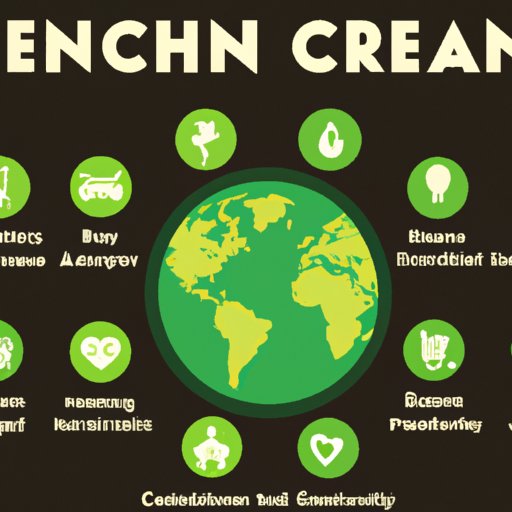Introduction
What is the cleanest country in the world? It’s a question that many people ask, but few can answer definitively. There are a number of factors that go into determining which countries are leading the way when it comes to environmental sustainability, from government policies to cultural values. In this article, we will explore what makes certain nations stand out as the cleanest countries in the world and examine the economic benefits of having a sustainable economy.
A Comparison of the Cleanest Countries in the World, Ranked by Environmental Sustainability
When looking at the cleanest countries in the world, Finland consistently ranks near the top. This Nordic nation has taken a proactive approach to environmental sustainability, with initiatives such as the “Circular Economy Action Plan” that aims to reduce waste and promote resource efficiency. Other countries that rank highly in terms of environmental sustainability include Sweden, Norway, Denmark, Austria, Germany, and Switzerland. These nations have strong environmental protection laws, renewable energy sources, and efficient waste management systems.
In addition to these traditional European nations, there are a number of other countries that are making significant strides towards environmental sustainability. Costa Rica, Singapore, and Uruguay all have ambitious plans to reduce their carbon footprints and promote green energy sources. New Zealand is also taking steps to protect its natural environment, with initiatives such as the “Zero Carbon Act” that aims to make the country carbon neutral by 2050.

Exploring the Culture and Practices of the Cleanest Nations on Earth
When looking at the culture and practices of the cleanest countries in the world, it is clear that environmental protection is a priority. In Finland, for example, citizens are encouraged to recycle and compost their waste, while businesses are incentivized to adopt green practices. Similarly, in Singapore, the government has implemented a range of measures to reduce air pollution and promote renewable energy sources. These measures include the promotion of electric vehicles and the construction of green buildings.
It is also important to note that many of the cleanest countries in the world have strong governments that prioritize environmental protection. In Norway, for instance, the government has implemented a range of policies to reduce emissions, such as a tax on carbon dioxide and subsidies for renewable energy sources. Similarly, in Costa Rica, the government has invested heavily in renewable energy projects, leading to a dramatic reduction in the country’s carbon footprint.
Examining the Economic Benefits of Being the Cleanest Country on Earth
The economic benefits of being the cleanest country in the world are numerous. For one, having a sustainable economy can attract foreign investment, as investors are increasingly looking for countries that prioritize environmental protection. Additionally, investing in green technologies can create jobs and stimulate economic growth. In Norway, for example, the government’s investments in renewable energy sources have created thousands of jobs and generated billions of dollars in revenue.
Furthermore, being the cleanest country in the world can provide a competitive advantage in the global marketplace. Companies in countries with strong environmental protection policies are more likely to be seen as reliable and trustworthy. This can give them an edge over competitors in less environmentally conscious countries.
An Overview of the Cleanest Countries in the World: What Factors Make them Leaders?
So what makes the cleanest countries in the world stand out from the rest? It is clear that there are a number of factors that contribute to a nation’s sustainability, including social, economic and political factors. On the social level, countries with strong environmental protection policies tend to have cultures that prioritize sustainability. In Finland, for instance, citizens are encouraged to reduce, reuse and recycle, while businesses are incentivized to adopt green practices.
On the economic level, countries with strong environmental protection policies tend to have more stable economies. Investing in green technologies can create jobs and stimulate economic growth, while reducing emissions can help a country become more competitive in the global marketplace. Finally, on the political level, countries with strong environmental protection policies often have governments that prioritize sustainability. In Norway, for example, the government has implemented a range of policies to reduce emissions and promote renewable energy sources.

The Global Impact of Having the Cleanest Country in the World: Challenges and Opportunities
Having the cleanest country in the world carries both opportunities and challenges. On the one hand, being the leader in environmental sustainability can provide a competitive advantage in the global marketplace, attract foreign investment, and stimulate economic growth. On the other hand, being the cleanest country in the world also carries a responsibility to set a good example for other nations. This means that the cleanest countries must continue to take action to reduce emissions and promote sustainability.
In addition, the cleanest countries in the world must work together to address global environmental issues, such as climate change. This requires cooperation between nations and a commitment to finding solutions that benefit all countries, not just the cleanest ones. Ultimately, having the cleanest country in the world is both an opportunity and a challenge, but it is one that can be met with the right leadership and commitment.
Conclusion
In conclusion, this article has explored what makes certain countries stand out as the cleanest in the world. We have looked at the social, economic and political factors that contribute to a nation’s sustainability and examined the potential benefits and challenges of being the cleanest country on earth. Ultimately, it is clear that environmental sustainability is a complex issue, and the cleanest countries in the world have a responsibility to lead the way and set an example for other nations.


